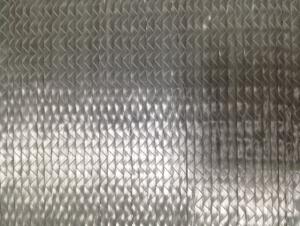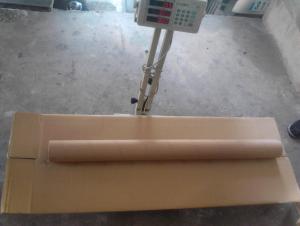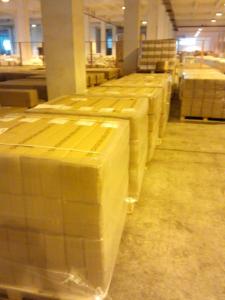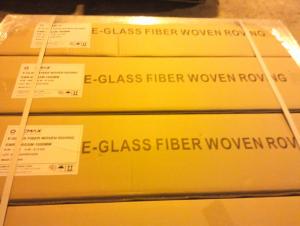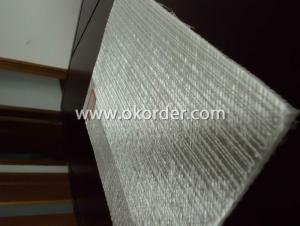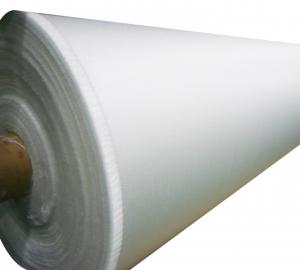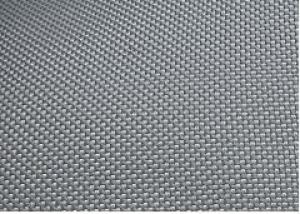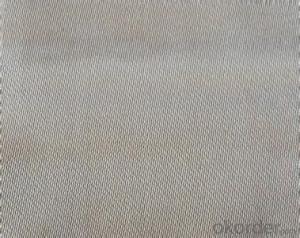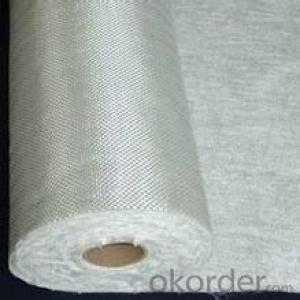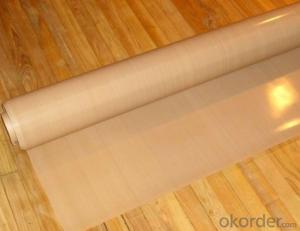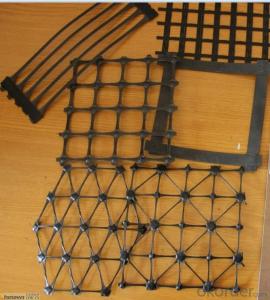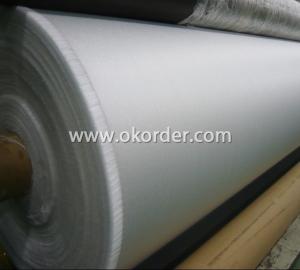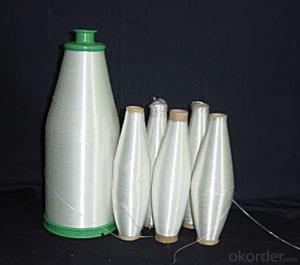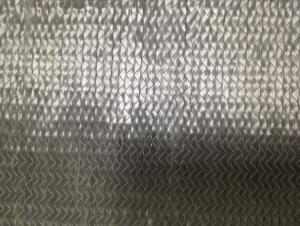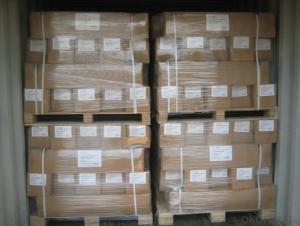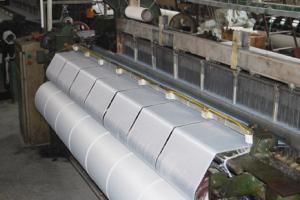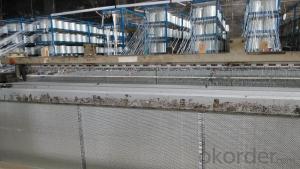HIGH QUALITY E-GLASS STITCH COMBO MAT-TTX
- Loading Port:
- China main port
- Payment Terms:
- TT or LC
- Min Order Qty:
- 1 kg
- Supply Capability:
- 100000 kg/month
OKorder Service Pledge
OKorder Financial Service
You Might Also Like
Brief Introduction: Fiberglass stitched combo mat (TTX)consists of two or more layers of fiberglass rovings which are stitch-bonded.one layer of rovings consists of parallel aligned roving and different layers of rovings can be oriented differently and have different linear density.The rovings specification,rovings orientation,number of rovings layers,mat width and roll diameter can be tailor-made according to customers' requirements. Characteristics 1. Manufactured by own factory SPECIFICATIONS
| ||||||||||||||||||||||||||||||||||||||||||||||||||||||||||||||||||||||||||||||||||||
FAQ
a.Pacage
Each Eglass stitched Combo Mat is wound onto a paper tube The roll is wrapped up with plastic film,and then packed in a cardboard box. The rolls can be vertically or horizontally placed. For transportation, the rolls can be loaded into a container directly or on pallets.
b.Product storage:
Unless otherwise specified, CHEMICAL FIBER GRIDDING CLOTH should be stored in a dry, cool and rain-proof area. It is recommended that the room temperature and humidity should be always maintained at 15℃~35℃ and 50%~75% respectively.
- Q:What are the different fiberglass fabric coatings for moisture resistance?
- There are several different fiberglass fabric coatings available for moisture resistance, including silicone, polyurethane, acrylic, and vinyl. These coatings create a barrier that prevents water from penetrating the fiberglass fabric, making it suitable for applications where moisture resistance is essential.
- Q:Can fiberglass fabric be used for insulation in petrochemical facilities?
- Indeed, insulation in petrochemical facilities can be achieved by utilizing fiberglass fabric. This material is widely embraced for its remarkable thermal properties and ability to endure high temperatures. It demonstrates resilience against the harsh conditions typically encountered in petrochemical facilities, such as intense heat, chemicals, and corrosive atmospheres. Furthermore, fiberglass fabric's lightweight nature, flexibility, and ease of installation make it a convenient choice for insulation applications. Moreover, it effectively aids in sound insulation, which is particularly advantageous in petrochemical facilities where noise reduction is of great importance. All in all, fiberglass fabric proves itself as a suitable option for insulation in petrochemical facilities due to its durability, thermal efficiency, and versatility.
- Q:XHJ how about neoprene asphalt waterproof coating?
- With a brush (usually paint brush) stained with paint, in the construction of the roof evenly brushing, so that the thickness of uniform, not piled up, not flowing, no leakage brush.
- Q:Are fiberglass fabrics suitable for use in medical or healthcare settings?
- Yes, fiberglass fabrics are suitable for use in medical or healthcare settings. Fiberglass fabrics offer a range of properties that make them ideal for use in these settings. Firstly, fiberglass fabrics are known for their high strength and durability. This makes them suitable for applications such as medical gowns, drapes, and curtains, where they need to withstand frequent handling and washing. The strong and tear-resistant nature of fiberglass fabrics ensures they can withstand the rigors of daily use in healthcare facilities. Additionally, fiberglass fabrics have excellent resistance to chemicals and are often used in medical environments where exposure to various substances is common. They have a high resistance to many solvents, acids, and bases, making them ideal for applications such as protective aprons, gloves, or masks that provide a barrier against hazardous substances. Furthermore, fiberglass fabrics have good thermal insulation properties. This is particularly beneficial in medical settings where temperature regulation is crucial, such as in incubators or thermal blankets. The thermal insulation properties of fiberglass fabrics help maintain a stable temperature, ensuring patient comfort and safety. Moreover, fiberglass fabrics can be manufactured with antimicrobial properties. This is essential in healthcare settings to prevent the growth and spread of bacteria and other microorganisms. Antimicrobial fiberglass fabrics can be used in items such as bedding, curtains, or privacy screens to reduce the risk of infection transmission. Lastly, fiberglass fabrics are lightweight and breathable, allowing for good air circulation and moisture management. This is important in medical or healthcare settings to prevent the build-up of moisture, which can lead to the growth of bacteria or fungi. The breathability of fiberglass fabrics also ensures patient comfort and reduces the risk of skin irritations. In conclusion, fiberglass fabrics offer a range of properties that make them suitable for use in medical or healthcare settings. Their strength, chemical resistance, thermal insulation, antimicrobial properties, and breathability make them ideal for various applications in these environments, ensuring the safety, comfort, and well-being of patients and healthcare professionals.
- Q:Are fiberglass fabrics resistant to mold or mildew?
- Fiberglass fabrics possess a general resistance to mold or mildew due to their non-porous nature and the fact that they do not foster ideal conditions for the growth of mold or mildew. They find common use in moisture-resistant applications, such as outdoor furniture, boat covers, and shower curtains. It is important to bear in mind, however, that while fiberglass fabrics themselves resist mold or mildew, the presence of organic materials like dirt, dust, or other organic matter on their surface can still provide an opportunity for such growth. Therefore, it is advisable to regularly clean and maintain fiberglass fabrics to ensure their longevity and resistance to mold or mildew.
- Q:Can fiberglass fabric be used for making wall coverings?
- Fiberglass fabric is an excellent choice for creating wall coverings. With its versatility and countless advantages, this material proves to be highly durable and resistant to wear and tear. This quality ensures that it will last for a long time, making it a reliable option for covering walls. Moreover, fiberglass fabric is fire-resistant, guaranteeing safety when used for wall coverings. Its ability to be easily tailored to fit any wall size or shape ensures a seamless and professional finish. Furthermore, this fabric comes in a wide variety of colors, textures, and patterns, providing endless design possibilities. In conclusion, fiberglass fabric is a practical and stylish solution for wall coverings.
- Q:What's the difference between wall fabric and fiberglass fabric? Which is better for brushing before latex paint? Why?
- Wall fabric features environmental protection, but you can imagine how environmentally friendly things are at the bottomFiberglass cloth is affordable and popularLatex paint mind if you buy environmentally friendly
- Q:Is fiberglass fabric resistant to chemicals in chemical processing plants?
- Fiberglass fabric, in general, exhibits resistance to chemicals commonly found in chemical processing plants. Its chemical resistance properties are well-known, making it a popular choice in various industrial settings, including chemical processing plants. Fiberglass demonstrates high resistance to a diverse range of chemicals, such as acids, alkalis, solvents, and other corrosive substances prevalent in chemical plants. This exceptional resistance contributes to the reliability and durability of fiberglass fabric as a construction material for equipment, piping, tanks, and other components in chemical processing plants. However, it is crucial to take into account the specific type and concentration of chemicals being handled when selecting the appropriate fiberglass fabric to ensure optimal chemical resistance.
- Q:Is fiberglass fabric resistant to tearing or ripping?
- Indeed, tearing or ripping does not pose a significant threat to fiberglass fabric. This robust and long-lasting material is frequently employed in scenarios where tear resistance holds great significance, such as the production of protective garments, industrial drapes, or reinforcements for composite components. The tightly woven composition of fiberglass fabric creates considerable obstacles for the propagation of tears or rips. Moreover, fiberglass exhibits remarkable tensile strength, thereby bolstering its resistance against tearing.
- Q:Characteristics and advantages of polyester glass fiber cloth
- Super waterproof layer availableInstalling waterproof layer under hot mix asphalt pavement is one of the best methods to protect and prolong the life of road. The anti cracking fabric of general material is deformed and damaged at high temperature. Polyester glass fiber cloth is made of non-woven glass fiber / polyester. It can withstand the high temperature construction of modified asphalt concrete. This high temperature stability of polyester glass fiber cloth will provide a continuous, non deformation waterproof layer, effectively prevent moisture infiltration, and avoid moisture infiltration caused by pavement and base damage.
1. Manufacturer Overview |
|
|---|---|
| Location | |
| Year Established | |
| Annual Output Value | |
| Main Markets | |
| Company Certifications | |
2. Manufacturer Certificates |
|
|---|---|
| a) Certification Name | |
| Range | |
| Reference | |
| Validity Period | |
3. Manufacturer Capability |
|
|---|---|
| a)Trade Capacity | |
| Nearest Port | |
| Export Percentage | |
| No.of Employees in Trade Department | |
| Language Spoken: | |
| b)Factory Information | |
| Factory Size: | |
| No. of Production Lines | |
| Contract Manufacturing | |
| Product Price Range | |
Send your message to us
HIGH QUALITY E-GLASS STITCH COMBO MAT-TTX
- Loading Port:
- China main port
- Payment Terms:
- TT or LC
- Min Order Qty:
- 1 kg
- Supply Capability:
- 100000 kg/month
OKorder Service Pledge
OKorder Financial Service
Similar products
New products
Hot products
Related keywords
